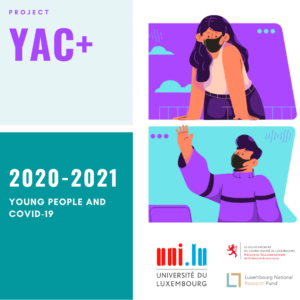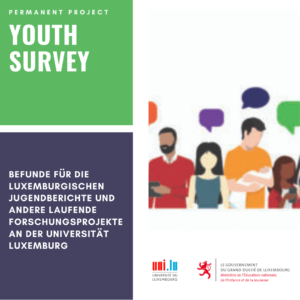Background: During 2020, most aspects of young people’s lives have been altered by the COVID-19 pandemic and the measures being implemented to contain it. Early studies on the effects of the COVID-19 pandemic suggest that confinement (so-called “lockdowns”) affect health, well-being and life satisfaction. However, the current situation in many countries is not confinement but prolonged deconfinement with less strict but still considerable measures and recommendations.
Objectives: The possible effects of this deconfinement on the health, well-being and life satisfaction of young people is the focus of this oral presentation, which is based on the YAC-Young Adults and COVID-19 study (see Residori et al., 2020).
Methods: The study relies on data collected from a random sample of residents of Luxembourg for the Youth Survey Luxembourg in Mai-July 2019 (age-range: 16-29, n=2.800) and in July 2020 (age-range: 12-29, n=3768, preliminary data). The data was gathered via online survey and using the same items as the HBSC study (self-rated health, life satisfaction (Cantril ladder) and the WHO-5 Well-being Index) (Sozio et al., 2020).
Results: The cross-sectional comparison of this representative data, explores the health, wellbeing and life satisfaction of young people in Luxembourg before and during the COVID-19 pandemic. The results are presented for the overall population and detailed by socio-demographic groups. For the 12-15-year-olds, the observed proportion reporting a low life satisfaction (<6) was, for example, 31.3% in 2020. This proportion has increased from 19.9% in 2019 to 25.5% in 2020 for the 16-20-year-olds, from 23.9% to 35.3% for the 21-25-year-olds and from 20.2% to 32.8% for the 26-29-year-olds.
Conclusion: The presentation will conclude on a reflection of the links between the observed differences and the measures implemented to during deconfinement as well as the scientific and political relevance of the observed differences for Luxembourg and other countries.




